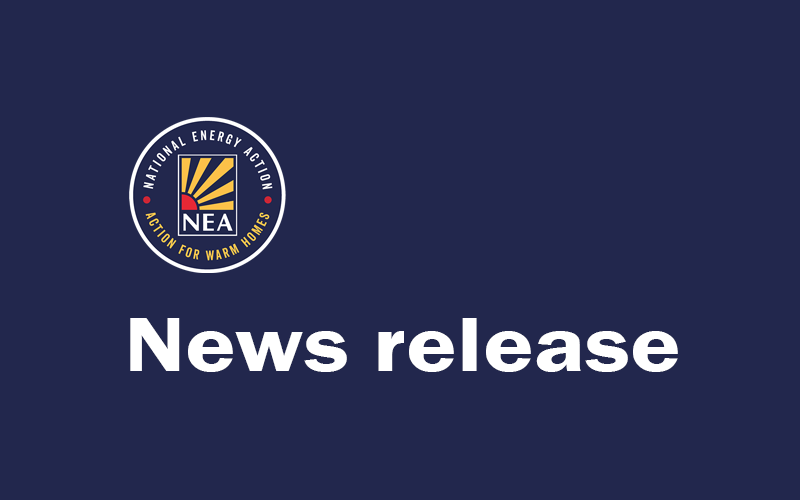A new paper published today [04 November 2020} on National Stress Awareness Day is warning UK debts owed to government and utility providers are set to soar due to the impacts of Covid. National Energy Action (NEA) has called for further improvements by utility companies, regulators and the UK Government to make it easier for customers to manage their household debt. Without urgent action, it says millions will be stuck in a ‘wilderness of debt’ and could suffer from severe mental illness, a range of physical illnesses and even premature death.
The author, Jess Cook, who leads the ‘People Living in Water Poverty and Fuel Poverty’ work programme at NEA, comments:
“In a relatively short space of time, households previously managing their finances now find themselves in a wilderness of debt, struggling and spiralling deeper and deeper into difficulty. For millions of people who don’t know when their situations will improve, the stress is unbearable. Not only can this lead to severe and prolonged mental illness, but also a range of physical illnesses such as headaches, backaches, ulcers, and increased blood pressure. The stress can also lead to premature death, whether as a result of illness or suicide.”
The report focuses on three sectors (energy, water and council tax). Water debt levels are significantly higher than the other two sectors. Although not always the case, water bills are also often one of the first bills to be defaulted on. The report also highlights areas of best practice in debt management guidance and ability to pay principles, outlining a series of recommendations which, if implemented, would significantly improve the ability of low-income and vulnerable households to clear their utility debt and help boost the economy.
Jess adds:
“Debt isn’t just about individual harm. It has a significant impact on utility suppliers and the wider economy. As we move into the colder months and towards Christmas, and especially given we’re set to move into a second national lockdown later this week, these impacts are likely to worsen rather than improve, but it doesn’t have to be the case. With sufficient will, we know it’s possible for utility companies, regulators and the UK Government to make it easier for customers to manage their household debts. We have highlighted some clear steps to help the hardest hit by this crisis clear their utility debt. This would bring relief for millions of people and help increase spending, boosting local economies”.
The paper comes as many debt charities and wider support agencies are highlighting the challenging situations their clients are facing. Citizens Advice estimates that 6 million UK adults have fallen into arrears – 3 million with water bills, 2.8 million with energy bills, 2.8 million with council tax, and 1.2 million with rent.
Earlier in the summer, the Chancellor announced a £38 million support package for debt advice providers helping people affected by Coronavirus. Last month, the energy regulator Ofgem announced positive changes to ensure all energy suppliers across Great Britain provide more support for customers struggling in debt, identify pre-payment customers who run out of energy credit and offer appropriate forms of advice and support. Whilst welcoming the moves, NEA says more help is needed.
Jess concludes:
“As highlighted in this report, utility suppliers quickly reacted to the first wave of this crisis by adapting the support they offered to those who were struggling. This, and the recent action seen by the Government and Ofgem, is a good start, but if we are to ease the long-term economic impact of the pandemic and the terrible stress and physical affects debt is causing, we need to wake to the scale of this challenge and fast”.
ENDS
Notes to editor
Contact: Sarah Wright, sarah.wright@nea.org.uk / 07884371913
The paper entitled ‘Surviving the Wilderness: The Landscape of Personal Debt in the UK’ is available here.
- NEA works across England, Wales and Northern Ireland to ensure that everyone in the UK can afford to live in a warm, dry home. To achieve this, it aims to improve access to energy and debt advice, provide training, support energy efficiency policies, local projects and co-ordinate other related services which can help change lives.
- NEA is working with Northumbrian Water Group (NWG) to deliver the ‘People Living in Water Poverty and Fuel Poverty’ work programme which aims to eradicate water poverty by 2030. The programme aims to establish an industry acknowledged definition of water poverty, and, understanding the links between water and fuel poverty, explore regional and national partnerships and projects to deliver positive outcomes for customers struggling with their utility bills.
- The paper entitled “Surviving the Wilderness: The Landscape of Personal Debt in the UK” is available here. Surviving the Wilderness has five key recommendations:
- The Government should bring forward Breathing Space and extend the respite period offered
- The UK Government should make contributions for payment matching schemes
- Consistent ‘Ability to Pay’ and debt collection principles should be implemented across all utilities
- Opportunities for maximising data sharing should be explored, including utilising existing mechanisms, such as building on the Priority Services Register and acting on powers within the Digital Economy Act, to ensure that support is offered to customers moving into financial difficulty at the earliest possible opportunity
- All utility companies should consider how a single definition of ‘severe indebtedness’ can ensure customers are treated fairly
- NEA’s paper builds on from another short report ‘The Gathering Storm: Utility Debt and Covid-19‘ published in June 2020, which can be accessed here.




